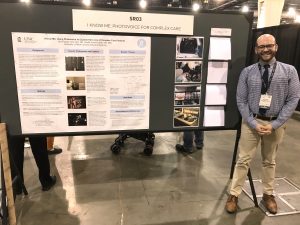Project
I Know Me: Using Photovoice to Foster Dialogue with Complex Care Patients
Timeline
- 2017: CHER Research Summer Program
- 2018 – present: Ongoing
Abstract
In 2015, nearly half of all Medicaid-only expenditures could be attributed to only five percent of Medicaid-only enrollees, a subset of patients referred to as “super-utilizers,” “hot spotters,” and “complex care” patients. Many of these patients demonstrate a “revolving door” pattern of hospital readmissions and emergency room visits, with limited preventive or primary care. Recent studies have associated age, marital status, education level and other socioeconomic factors with frequent hospital readmission, which invites a deeper investigation into how structural vulnerability and multiple medical illnesses interact to shape this costly, ineffective pattern of healthcare utilization.
This pilot feasibility study assesses the utility of photovoice, a qualitative research method that uses photographs taken by study participants as its primary source of qualitative data, as a tool for collecting information regarding social determinants of health (SDH) among “complex care” patients. Participants are recruited from complex-care management programs at UNC and associated hospitals. Each participant borrows a digital camera for one week, and takes photographs in response to the question: What makes it easier or harder for you to be healthy? These images, along with transcribed conversations between each participant and the investigator, will undergo constant comparative analysis to identify common themes between them, including specific socioeconomic barriers to care.
Outcomes and Impact
Each of these images presents a unique, complex narrative. Some share details — including transportation challenges and substance abuse history — that could strongly impact treatment plans. Even before formal analysis, these powerful images challenge common assumptions about complex care patients, inviting meaningful dialogue about the interaction between mind, body and environment in shaping a person’s overall health.
 Study Team
Study Team
- Benjamin Kaplan (Principal Investigator)
- Giselle Corbie-Smith, MS, MSc (Faculty Advisor)
- Amy Weil, MD (Faculty Advisor)
 Partner Organizations
Partner Organizations
- Triangle Interprofessional Partners for Prevention
- UNC Family Medicine Transitions Program
 Funding Source
Funding Source
Sutton Medical Education Excellence Fund (UNC Medical Education; Medical Foundation)
 Presentations
Presentations
- “I Know Me: Using Photovoice to Foster Dialogue with Complex Care Patients.” Inaugural Paul A. Godley Health Equity Symposium, UNC School of Medicine, Chapel Hill, NC, March 2020.
- “Whitehead Grand Rounds: Using Photovoice to Foster Dialogue with Complex Care Patients.” UNC School of Medicine, Chapel Hill, NC, October 2019.
- “I Know Me: Using Photovoice to Foster Dialogue with Complex Care Patients.” American Academy of Family Physicians (AAFP) Family Medicine Experience (FMX) Conference, Philadelphia, PA, September 2019.
- “I Know Me: Using Photovoice to Foster Dialogue with Complex Care Patients.” American Academy of Family Physicians (AAFP) National Conference, Kansas City, MO, July 2019.
- “I Know Me: Using Photovoice to Foster Dialogue with Complex Care Patients.” North Carolina Academy of Family Physicians (NCAFP) Annual Meeting, Asheville, NC, November 2018.
- “Behind the lens: what digital photovoice can teach us about engaging complex care patients (workshop).” Society of General Internal Medicine Annual Meeting, Denver, CO, April 2018.
- “Health Humanities Grand Rounds: I Know Me.” UNC School of Medicine, Chapel Hill, NC, April 2018.
- “I Know Me: Using Photovoice to Foster Dialogue with Complex Care Patients.” John B. Graham Student Research Day, UNC School of Medicine, Chapel Hill, NC November 2017.

 Awards and Recognitions
Awards and Recognitions
- Third prize in student research, American Academy of Family Physicians FMX National Conference, September 2019.
- Harold C. Pillsbury Student Research Award for Outstanding Public Health Oral Presentation, John B. Graham Student Research Day, November 2017.
 Contact Info
Contact Info
- Email: benjamin_kaplan@med.unc.edu
- Twitter: @ben_j_kaplan
